|
|
|
Sort Order |
|
|
|
Items / Page
|
|
|
|
|
|
|
| Srl | Item |
| 1 |
ID:
124429
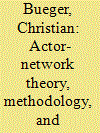

|
|
|
|
|
| Publication |
2013.
|
| Summary/Abstract |
Since its initial formulation in science and technology studies, actor-network theory (ANT) has spread like wildfire throughout the social sciences. Wildfires are fueled by dry and flammable vegetation as well as hot, gusting winds. ANT finds flammable vegetation among those frustrated with many of the conventions, dualisms, and dilemmas of the traditional social sciences. ANT promises to liberate scholars from strict dualisms such as the nature/society divide and the agency/structure dilemma. It claims to open up a reflexive discourse on what constitutes the practice of science. ANT's avant-garde spirit further fuels the fire. Others reject ANT. They (rightfully) lament the often-awkward terminology of ANT, its lack of appropriately defined models and concepts, its literary style of presentation, as well as the radical rhetoric that often comes along with it. For many, the question of what actually constitutes ANT remains mysterious, and it is often unclear whether it is more than a "new materialist" argument for taking objects, things, and technology seriously.
|
|
|
|
|
|
|
|
|
|
|
|
|
|
|
|
| 2 |
ID:
105935
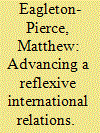

|
|
|
|
|
| Publication |
2011.
|
| Summary/Abstract |
This article advances a call for greater reflexivity in International Relations (IR) to uncover various intellectual and political biases that may obscure the research process. Inspired by existing reflexive practices in IR and, in particular, Pierre Bourdieu's use of such a method, it argues that reflexivity matters for enhancing ethically grounded research, in terms of not only the choice of subjects to study, but also how specific problems are treated, and hence what kind of results can be expected. However, the argument also goes beyond the appeal to autobiographical reflexivity to embrace other dimensions. This includes attention to institutional forces that shape the agency of the scholar and, in turn, the complex relationship between the academy and the wider political world. In the most ambitious sense, the potential for reflexivity can also be conceived collectively in terms of activist intellectuals who seek to reward reflexive practices through dialogue and political intervention. The social space of international trade politics is taken as an empirical example.
|
|
|
|
|
|
|
|
|
|
|
|
|
|
|
|
| 3 |
ID:
137722
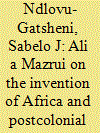

|
|
|
|
|
| Summary/Abstract |
Ali A Mazrui’s academic and intellectual fame provoked both deep admiration and severe criticism, causing his intellectual legacy to be caught up between what the South Sudanese scholar Dustan M Wai depicted as ‘Mazruiphilia’ (hagiographical celebration) and ‘Mazruiphobia’ (critical bashing). Mazrui died on 12 October 2014, leaving behind a ‘supermarket of ideas’ and a rich archive that easily immortalises him. This article aims to transcend both Mazruiphilia and Mazruiphobia through the adoption of an approach which avoids a sententious orientation while critically engaging with Mazrui’s contributions to the topical questions of the invention of Africa, Africanity and the African condition. From Mazrui’s ‘supermarket of ideas’ the article takes one of the debates in his expansive work – that of Africanity – as its departure point to engage with his contribution to African Studies and pay tribute to this African intellectual giant.
|
|
|
|
|
|
|
|
|
|
|
|
|
|
|
|
| 4 |
ID:
181221
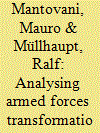

|
|
|
|
|
| Summary/Abstract |
There is scant research on models for visualising strategies retrospectively. The authors present a new analytical, visual methodology for assessing the transformation of armed forces, which is usually considered to be the “second dimension” of strategy. It is novel and generally applicable to armed forces, and additionally provides several benefits, in particular with regard to its synoptic character. The methodology translates a sociological approach into strategic studies, a discipline which has not really developed its own yet. It is exemplified by means of the (airborne part of the) Swiss Air Force's transformation since the end of the Cold War.
|
|
|
|
|
|
|
|
|
|
|
|
|
|
|
|
| 5 |
ID:
156638
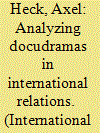

|
|
|
|
|
| Summary/Abstract |
In contemporary international relations, we are facing a lively discussion among scholars who are using all sorts of visual artifacts. Since representations of international politics in popular culture and mass media have been theorized more systematically, fictional films, TV series, as well as non-fictional documentaries have become relevant research objects. What is still missing is a conceptualization of the genre located between fictional and non-fictional film—docudrama. This genre is highly relevant for IR because many filmmakers have specialized in docudramatic depictions of historic events or more recent issues in international politics in which facts and fiction are combined into narratives about the events and the behavior of the people involved. But analyzing films is not unproblematic. Although a debate on the importance of film analysis in IR is occurring, methodological reflections have only just begun. Accordingly, this article draws on a film analytical methodology developed by Bordwell, which is applied to a docudrama about the Kunduz airstrike of September 2009.
|
|
|
|
|
|
|
|
|
|
|
|
|
|
|
|
| 6 |
ID:
177923
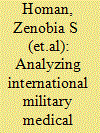

|
|
|
| 7 |
ID:
119990
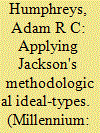

|
|
|
|
|
| Publication |
2013.
|
| Summary/Abstract |
In The Conduct of Inquiry in International Relations, Patrick Jackson situates methodologies in International Relations in relation to their underlying philosophical assumptions. One of his aims is to map International Relations debates in a way that 'capture[s] current controversies' (p. 40). This ambition is overstated: whilst Jackson's typology is useful as a clarificatory tool, (re)classifying existing scholarship in International Relations is more problematic. One problem with Jackson's approach is that he tends to run together the philosophical assumptions which decisively differentiate his methodologies (by stipulating a distinctive warrant for knowledge claims) and the explanatory strategies that are employed to generate such knowledge claims, suggesting that the latter are entailed by the former. In fact, the explanatory strategies which Jackson associates with each methodology reflect conventional practice in International Relations just as much as they reflect philosophical assumptions. This makes it more difficult to identify each methodology at work than Jackson implies. I illustrate this point through a critical analysis of Jackson's controversial reclassification of Waltz as an analyticist, showing that whilst Jackson's typology helps to expose inconsistencies in Waltz's approach, it does not fully support the proposed reclassification. The conventional aspect of methodologies in International Relations also raises questions about the limits of Jackson's 'engaged pluralism'.
|
|
|
|
|
|
|
|
|
|
|
|
|
|
|
|
| 8 |
ID:
164285
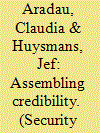

|
|
|
|
|
| Summary/Abstract |
Critical approaches in security studies have been increasingly turning to methods and standards internal to knowledge practice to validate their knowledge claims. This quest for scientific standards now also operates against the background of debates on ‘post-truth’, which raise pressing and perplexing questions for critical lines of thought. We propose a different approach by conceptualizing validity as practices of assembling credibility in which the transversal formation and circulation of credits and credentials combine with disputes over credence and credulity. This conceptualization of the validity of (critical) security knowledge shifts the focus from epistemic and methodological standards to transepistemic practices and relations. It allows us to mediate validity critically as a sociopolitical rather than strictly scientific accomplishment. Developing such an understanding of validity makes it possible for critical security studies and international relations to displace epistemic disputes about ‘post-truth’ with transversal practices of knowledge creation, circulation and accreditation.
|
|
|
|
|
|
|
|
|
|
|
|
|
|
|
|
| 9 |
ID:
075091


|
|
|
|
|
| Publication |
Leiden, African Studies Centre, 2005.
|
| Description |
xv, 408p.
|
| Series |
African Studies Centre Research Report 77/2005
|
| Standard Number |
9054480160
|
|
|
|
|
|
|
|
|
|
|
|
Copies: C:1/I:0,R:0,Q:0
Circulation
| Accession# | Call# | Current Location | Status | Policy | Location |
| 051941 | 303.60967/NOO 051941 | Main | On Shelf | General | |
|
|
|
|
| 10 |
ID:
117915
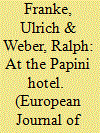

|
|
|
|
|
| Publication |
2012.
|
| Summary/Abstract |
Pragmatism is ever more popular amongst those who study international relations. Its emphasis on practice is generally acknowledged as a defining characteristic. There is, however, a general tension within pragmatist thought concerning practice, for pragmatism may emphasize the theorizing of practice. It is, then, distinguished from other theories in International Relations (IR) such as neo-realism or constructivism as a contender in their midst. We delineate a pragmatist theory of IR in the first part of this article, but insist on going beyond merely establishing the next paradigm, for pragmatism may also emphasize the practice of theorizing. Theories are, then, considered different tools useful for dealing with the social world. This will be corroborated in the second part by a close reading of William James. Finally, we submit that instead of a paradigm war, a metaphor such as that of the Papini hotel is needed in IR - a metaphor that accounts for theory competition without neglecting the limitations set by the practice of theorizing itself.
|
|
|
|
|
|
|
|
|
|
|
|
|
|
|
|
| 11 |
ID:
183839
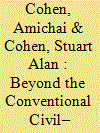

|
|
|
|
|
| Summary/Abstract |
This article modifies the framework for the analysis of civil–military “gaps” proposed in Armed Forces & Society (Vol. 38, 2012) by Rahbek-Clemmensen, Archer, Barr, Belkin, Guerro, Hall, and Swain, who depicted a continuum of four binary fissures (“gap dimensions”) dividing two hypothetically homogeneous communities: civilians versus military personnel. Extrapolating from Israel’s experience, this article instead visualizes a more dynamic and fissured landscape, inhabited by several heterogeneous clusters of population groups, each comprising impromptu coalitions drawn from both the armed forces and civilian society. That environment, we argue, although certainly influenced by the traditional penetrability of Israel’s civil–military boundaries, more directly reflects current technological and cultural processes, which are transforming encounters between civilians and military personnel in other countries too. We therefore suggest replacing the predominantly dichotomous taxonomies that generally characterize studies of civil–military relations in contemporary democratic societies with the fractured format observed in the Israeli case.
|
|
|
|
|
|
|
|
|
|
|
|
|
|
|
|
| 12 |
ID:
126817
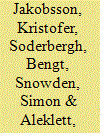

|
|
|
|
|
| Publication |
2014.
|
| Summary/Abstract |
Bottom-up models of oil production are continuously being used to guide investments and policymaking. Compared to simpler top-down models, bottom-up models have a number of advantages due to their modularity, flexibility and concreteness. The purposes of this paper is to identify the crucial modeling challenges, compare the different ways in which nine existing models handle them, assess the appropriateness of these models, and point to possibilities of further development. The conclusions are that the high level of detail in bottom-up models is of questionable value for predictive accuracy, but of great value for identifying areas of uncertainty and new research questions. There is a potential for improved qualitative insights through systematic sensitivity analysis. This potential is at present largely unrealized.
|
|
|
|
|
|
|
|
|
|
|
|
|
|
|
|
| 13 |
ID:
173395
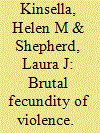

|
|
|
|
|
| Summary/Abstract |
This article highlights Marysia Zalewski's scholarship as reflective and generative of the multifarious sources and contributions of feminist IR and its ‘scavenger methodologies’, which seek to centre subjects, processes, and practices historically excluded, ignored, and minimised. The productive depth of her scholarship is evident in the uniqueness of each article in this collection, all of which distinctly document the uses to which Zalewski's writings can be uniquely put. Each of the articles performs a ‘turning operation’ of sorts on the elementals of feminist IR (gender/women/power/difference) and brings further elaborations of masculinities, sexualities, silences as well as screams, that shift and change what is taken to be feminist research/method – at each point disordering our sensibilities and our assumptions as to what we do when we do feminist work.
|
|
|
|
|
|
|
|
|
|
|
|
|
|
|
|
| 14 |
ID:
175713
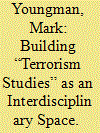

|
|
|
|
|
| Summary/Abstract |
Over the years, there have been many debates regarding the state of research into terrorism and whether “terrorism studies” constitutes an academic discipline in its own right. Such reflections, coupled with the natural evolution of what is still a relatively new area of research, have arguably led to significant improvements in quality and rigour. At the same time, the status of terrorism studies itself remains somewhat ambiguous: it is both discussed as a distinct field and simultaneously evades criticism by pointing to the difficulties of defining its boundaries. There are undoubtedly a number of advantages to forming a separate discipline, which would go some way to helping the field address some of the recurring problems that terrorism research faces. However, this article ultimately argues that scholars are better served by deliberately moving in the other direction and developing the field as a space for interdisciplinary engagement.
|
|
|
|
|
|
|
|
|
|
|
|
|
|
|
|
| 15 |
ID:
139421
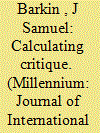

|
|
|
|
|
| Summary/Abstract |
This article suggests to quantitative methodologists that the tools that they use (and often others they do not) are more broadly applicable than is often assumed; to reflexivist researchers that there are many more tools available to their research than are often seen as appropriate; and to the IR discipline writ large that most of the disciplinary thinking about the relationships between research, ontology, epistemology, methodology and methods is unnecessarily narrow. Our core goal is to reveal the problematically inaccurate nature of both the qualitative/quantitative and the positivist/post-positivist divides, as well as of traditional methods training. We suggest that the ability to pair, and the utility of pairing, quantitative (traditionally neopositivist) methods with critical (traditionally non-neopositivist) theorising makes this intervention. To this end, the article begins with discussions of the relationships between epistemology and method in IR research. We continue on to frame a disunity of social science in the quantitative/qualitative divide, which lays the groundwork for a section rethinking traditional understandings of how methods, methodology, and epistemology relate. We then make the case for the utility of methods traditionally classified as ‘quantitative’ for critical research in IR. The article concludes by discussing the transformative implications of this understanding for critical theorising, and for theorising knowledge within disciplinary IR.
|
|
|
|
|
|
|
|
|
|
|
|
|
|
|
|
| 16 |
ID:
164835
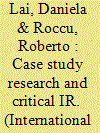

|
|
|
|
|
| Summary/Abstract |
Discussions on case study methodology in International Relations (IR) have historically been dominated by positivist and neopositivist approaches. However, these are problematic for critical IR research, pointing to the need for a non-positivist case study methodology. To address this issue, this article introduces and adapts the extended case methodology as a critical, reflexivist approach to case study research, whereby the case is constructed through a dynamic interaction with theory, rather than selected, and knowledge is produced through extensions rather than generalisation. Insofar as it seeks to study the world in complex and non-linear terms, take context and positionality seriously, and generate explicitly political and emancipatory knowledge, the extended case methodology is consistent with the ontological and epistemological commitments of several critical IR approaches. Its potential is illustrated in the final part of the article with reference to researching the socioeconomic dimension of transitional justice in Bosnia and Herzegovina.
|
|
|
|
|
|
|
|
|
|
|
|
|
|
|
|
| 17 |
ID:
178370
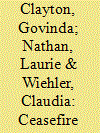

|
|
|
|
|
| Summary/Abstract |
The causes and consequences of ceasefires have become a burgeoning area of research. The concept of ceasefire success is integral to this research and plays a key role as either the dependent or independent variable in both qualitative and quantitative work. Despite its importance, it is not clear how ceasefire success should be conceptualized. This critically hampers the progress of theoretical and empirical research on ceasefires. This article offers a conceptual framework based on the central proposition that ceasefire success should be assessed in terms of two inter-related but conceptually distinct criteria: the immediate objective and the underlying purpose. The immediate objective, which is embedded in the definition of a ceasefire, is the cessation of hostilities (either permanently or temporarily). While all ceasefires share this objective, their underlying purpose, which is the reason for establishing the ceasefire, varies widely across cases. The immediate objective and the purpose, while conceptually distinct, are linked since the purpose informs the temporal and geographic scope of the cessation of hostilities. Based on this framework, we argue that researchers interested in ceasefire success need to clearly identify their assumptions and conceptual choices, which should take account of the political context of the ceasefires in question.
|
|
|
|
|
|
|
|
|
|
|
|
|
|
|
|
| 18 |
ID:
119986
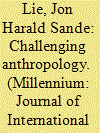

|
|
|
|
|
| Publication |
2013.
|
| Summary/Abstract |
Ethnography and anthropology are intrinsically linked, but recently other disciplines have started to draw inspiration from anthropological methods. The ongoing ethnographic turn in International Relations has spurred debate on what ethnography is, what it means and entails in practice, and how to apply it in International Relations. Some assert that the ethnographic turn could not have taken place without adopting a selective and antiquated notion of ethnography; others counter that this argument draws on a caricatured version of ethnography. This article offers one anthropologist's reflections on these issues, drawing on ethnographic work within an international organisation and a state apparatus - both of which are areas of study more common in International Relations than in anthropology. This is not an International Relations turn of anthropology, but the practical and methodological challenges it involves are relevant to the ethnographic turn of International Relations and the disjuncture between the ethnographic ideals and anthropological practice.
|
|
|
|
|
|
|
|
|
|
|
|
|
|
|
|
| 19 |
ID:
170368
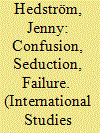

|
|
|
|
|
| Summary/Abstract |
This article highlights the influence of emotions, affective experiences, and rumors on the construction of knowledge within research on conflict and in international politics, as well as within the research process itself. Drawing from fieldwork undertaken in a conflict zone in Myanmar, it suggests that academic knowledge production practices are informed both by the (violent) context in which research is undertaken and by the demands of the discipline to produce a scientifically accepted piece of research. It proposes that attention to emotions may facilitate strong objectivity (Harding 1992) by foregrounding the relationship between research participants, researchers, and the broader research (institutional and immediate) contexts. It introduces the term “rumors-as-affect” as a means to discuss how affective atmospheres or events in the research environments inform research. Three interview situations are presented, in which different emotional reactions are highlighted, focusing on “confusion and guilt”; “seduction”; and finally, “failure and ignorance.” These events illustrate how, in recognizing the role emotions and affective atmospheres play in research on conflict and in international politics (cf. Crawford 2014; Hutchison and Bleiker 2014; Ross 2013), researchers may begin to do justice to our representations of what is encountered in the field and how knowledge is constructed within the discipline.
|
|
|
|
|
|
|
|
|
|
|
|
|
|
|
|
| 20 |
ID:
148282
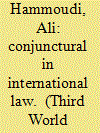

|
|
|
|
|
| Summary/Abstract |
This article will detail an event of revolutionary action in the historiography of anti-colonial and anti-imperial struggle in Iraq, namely al-Wathba (‘the leap’) of 1948, utilising it as an example to address the limitations of the methodology and analysis of Third World Approaches to International Law (TWAIL) scholarship. I will argue that there is a disconnect between notions of agency and structure in TWAIL analyses and that therefore TWAIL scholars should consider studying the conjunctures that allowed certain movements ample room to struggle against the imperialism of international law in the first place. I will use the example of the Wathba to illustrate how a conjunctural analysis may be undertaken, analysing its implications for the international legal order. I will then move to highlight the significance of labour to the conjuncture in question. Finally, I will demonstrate how events like the Wathba illuminate the transient and provisional nature of the foundations of international law, while emphasising its structural constraints.
|
|
|
|
|
|
|
|
|
|
|
|
|
|
|
|
|
|
|
|
|